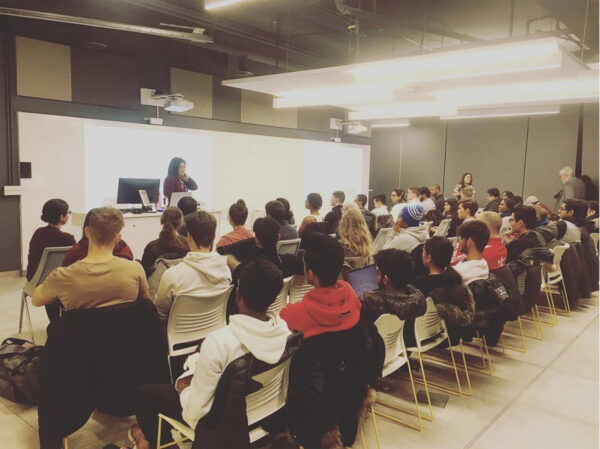Mercier Seminar with Karen Lai

On February 4, BEST Lab hosted its 7th Mercier Seminar at Lassonde School of Engineering with Karen Lai, the President and CEO of KPM Power Inc. Karen studied Mechanical Engineering and worked in industry for 12 years before she started her company. She shared her learnings with our students on how she started her company from bootstrapping. Here are her insights:
How did you start your company?
- I made about 3 different business plans. My goal in each business plan was I wanted to make money in the first year. Just because you have a plan, it doesn’t mean you execute on that plan. The question is do you bet your house on it? If not, the question is why? What are the risks? If you are unsure, do more market research. Talk to people in the industry, does your idea make sense? Do people feel a need?
- My business plan was all about cashflow predictions. How quickly can I make money? How quickly can I close an opportunity?
- In my 3rd business plan, I am still following the same vision and step currently. I still believe in my plan.
- Bootstrapping is building a company from the ground up with nothing but personal savings and, with luck, the cash coming in from the first sales.
What are the foundation for Bootstrapping?
- Investing in yourself for something better
- Work hard and show your worth
- Believe in yourself and surrounded yourself with people who believe in you.
- Sales is important, starting small, $5K, $10K, eventually become $50K, $100K, creating a reputation of integrity, resilience and commitment, customers will believe in you as well
- Don’t spend on unnecessary things, be generous to those who help you.
- Good credit, as a business with no previous record, the bank’s only reference is how you perform on your personal credit. Make sure you create a relationship with the bank and make sure they have a history of your business with that bank.
- Good mentorship: having someone to bounce ideas back and forth is great and the mentor keeps you on track with your business plan
How did you get customers?
- A plan. You need a business plan. What do you ultimately want to do?
- You need a sales plan. How are you going to generate revenue? Think out of the box? What can you do to get money quickly? Who are customers to target? For me, the only thing I could offer was my labour. I consulted. I put all the money into the company and I basically worked to pay my team members. My revenue generation plan was:
- Consulting – charging time, at the same time reach out to customers that can sell to
- What did customer’s want? They wanted their products launched, I used my supply chain expertise and helped them source material in China. I used my expertise in this area to focus on building the strategy suppliers in China.
- All profits are to be invested back into R&D. I wanted our Battery Management System launched. I wanted to sell a product not a service. Once the BMS sells, then we can use those profits to launch our battery pack.
What happens when things stray from the plan?
- Stay focussed on the plan end goal, things will stray. For example, I had a budget set for lawyer, accountant and marketing. I had a friend who was a lawyer and I was going to pay her to help us incorporate. She disappeared when I needed her to incorporate. I didn’t realize I would get a contract a week after quitting my job. So I had to incorporate. Lawyers are really busy. So I had to figure out how to incorporate myself. I was so nervous if I was doing everything right. I lucked out and I did. Accountants disappeared. I had to learn to do my own bookkeeping and understand my numbers. This actually is crucial for any business owner to fully understand their numbers. Expenses will creep and you need keep fixed costs low especially if you are not generating enough revenue to pay yourself.
What is your view about failures?
- I think to learn is to fail. I think it is important to fail quickly and recover quickly. Almost failing school was a wake up call. Failure to speak up about my first pay was a learning lesson but I wouldn’t have learned to negotiate if that didn’t happen. Failure to pace myself lead to a burn out. I wouldn’t have realize how a break could make me think clearer and bigger. Other failures that I have learned on the way is over trusting people. People do not always have good intentions or have the intentions they seem to be offering. There was a Women’s Cleantech Challenge a couple of years ago. I made it to Top 30. A CTO of an automotive company tried to manipulate me to start a company with him just so he can use me as a puppet to pitch for him to get that $1M. I thought it was quite sad that there are people out there like that.
What are the benefits of bootstrapping?
- The best benefits of bootstrapping is you are your own boss. You are not depending on an investor to tell you the direction to take your company. As I said, if you believe in your idea, are you willing to bet your house on it? So in my case, we only invested $17,000 into our company. The growth from our business is purely on sales.
- You learn to build a company from scratch. When it does well, it is quite rewarding.
- When you start making money, banks are a lot more willing to help you.
